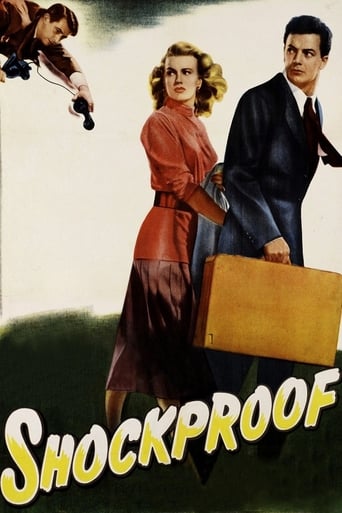adonis98-743-186503
Jenny Marsh, still dangerously attractive after 5 years in prison for killing a man in defense of her shady lover Harry, clashes at first with parole officer Griff Marat, who's determined to make Jenny go straight. Neither charming or romantic enough to be satisfying 'Shockproof' is a pretty boring, muddled and quite generic flick that even tho it was made in 1949 we can still see in times like this and believe me i don't mean that in a good way. The acting wasn't anything great and the storyline was for sure far from anything special as well for sure. (0/10)
Henchman_Number1
Real life husband and wife Cornel Wilde and Patricia Knight star as parole officer / parolee in this quasi noirish post-war drama. Wilde, who is assigned as Knight's parole officer, insists that as a condition of her parole she no longer associate with her former boyfriend, unsavory gambler (John Baragrey). Wilde who is smitten almost immediately by Knight, begins to bend the rules as Knight ignores the conditions of her parole and continues to see Baragrey. Because of her parole violations, Wilde being a concerned officer of the court, suggests Knight move into his home that he shares with his blind, widowed mother and younger brother. The situation continues on a downward trend.Written by hard edged, cigar chomping, World War II vet Samuel Fuller and directed by melodrama master Douglas Sirk, this movie is a contrast of styles between writer and director. In this case the director Sirk called the shots. With the assist of a script revision from Helen Deutsch (I'll Cry Tomorrow, Valley of the Dolls), Sirk plays it out more as a tortured romantic triangle with dribs and drabs of writer Fuller's permeating cynicism occasionally popping through. Despite a title suggesting more lurid content, 'Shockproof' offers little to actually be shocked by, probably because of the lack of any real criminal intent by the characters beyond parole violations. What tension this movie engenders is more human conflict from the soap opera style re-draft by Deutsch. With a script basically hollowed from Fuller's fatalistic influence, what's left is a sort of a well-crafted but tepid potboiler complete with a contrived populist ending. 'Shockproof' isn't a bad movie just more of a disappointment of what could have been.
MartinHafer
I chose to watch this film because it was written by Sam Fuller--and Fuller was a freakin' genius at making exceptional small-budget films. However, as you'll notice from the IMDb trivia that Fuller's original tough-as-nails ending was changed--and a cheap clichéd ending was added. And, after watching it, I would agree that the ending was terrible--but what occurred before that wasn't a whole lot better.The film begins with a lady getting paroled. She'd murdered someone and her parole officer (Cornell Wilde) insists she cannot see her old boyfriend as a condition of parole. However, the next day she's caught with him. Instead of violating her parole, he instead treats her very, very strangely. Like a total sap, he brings her and another parolee home to meet his family and have dinner with them! Soon, he hires her to look after his blind mother--and she's practically part of the family. You wonder if any officer could ever have been that stupid or have such poor personal boundaries! You assume that any parole officer behaving like he does during the film would be immediately fired! Throughout much of the film, it's obvious she's playing her parole officer and secretly meets with the old boyfriend. Eventually, however, it's uncertain--could she be falling in love with Wilde? You sure as heck know he's falling for her! This is a film where you very seriously have to suspend your sense of disbelief--otherwise the plot simply won't make any sense. After all, Wilde's character is absolutely unbelievable...and as the film progresses, he gets worse and worse! As for me, I wasn't able to suspend my belief THIS much! I am not sure how much of this was due to Fuller and how much was due to studio meddling, but it was a problematic script from the outset. It MIGHT have worked if Wilde had played a dishonest p.o. from the outset--not the super-officer he was supposed to be. The one redeeming value the film has is the great dialog--very gritty and enjoyable for fans of film noir (except for the inexplicable line about 'getting a crook' and moving to California). But the story just didn't make any sense and it clearly could have used a re-write or just an entirely new plot--and an ending that is believable. The story could have worked, but instead of tense film noir it sometimes closer resembled "Dumb and Dumber"! Could a supposedly smart man act dumb over a 'dame'? Sure--but the film just didn't sell the idea well at all.
marcslope
Like other early Douglas Sirks, this noir doesn't delve very far into his later themes of American hypocrisy or false values, and it has none of the visual flair for which he became known. It's just a mild, casually plotted melo about a parole officer who falls for his charge and ends up on the lam with her. Wilde, though he was then married to his pretty leading lady, Patricia Knight, doesn't seem very interested in her, and the rest of the no-name cast is trapped in a web of poor character motivations and listless dialog. The resolution is, as another poster noted, hilariously out of left field -- that character would never do that. On the plus side, we get some nice shots of 1948 L.A., and a few scenes in an oil field camp with one-room worker shacks feel authentically gritty and mid-century. But as a romance, it's unconvincing, and as a noir, it's without thrills.



